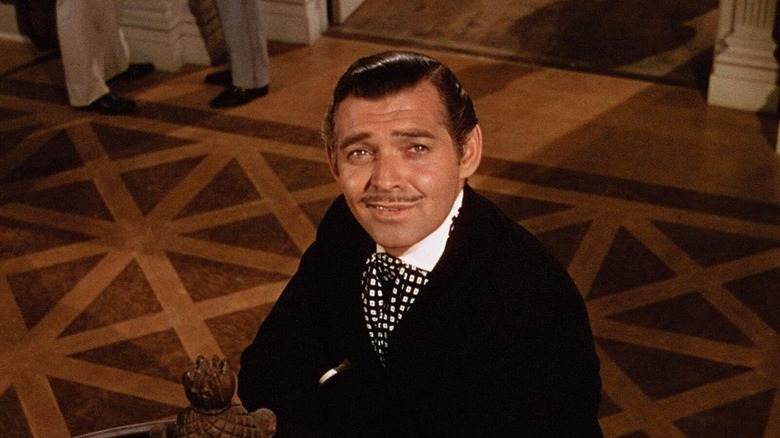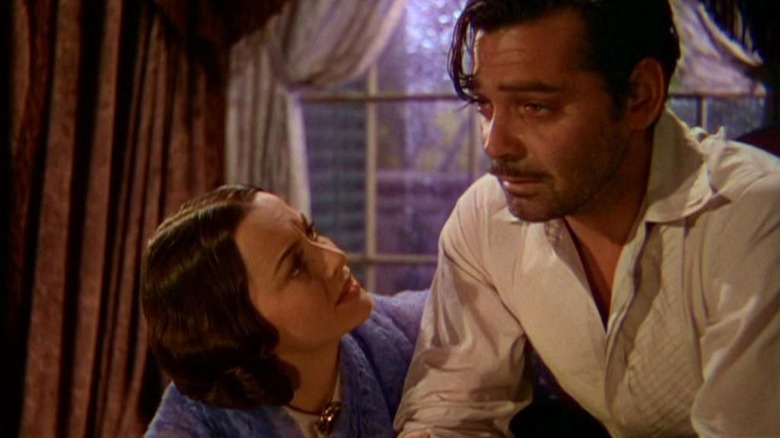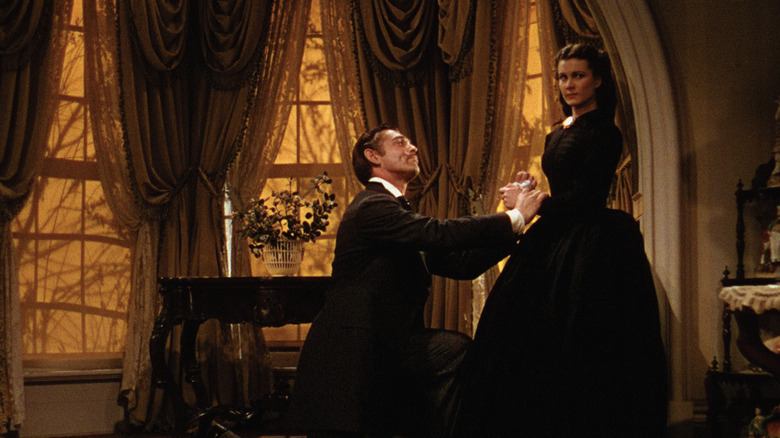Clark Gable 'Violently Opposed' A Sensitive Scene In Gone With The Wind
Victor Fleming's 1939 mega-hit "Gone with the Wind" — winner of 10 Academy Awards, and, adjusted for inflation, the highest-grossing film of all time — is what one in a more generous mood might call "problematic." For decades, many critics and audiences (that is to say, white critics and audiences) gave "Gone with the Wind" something of a "hall pass," citing its strong character work (Vivien Leigh is magnificent, and Clark Gable is in charm overdrive) and ultra-slick Hollywood production values as eternally noteworthy. Its racist stereotypes were merely unfortunate.
Black critics, meanwhile, pointed to the dark truth of the movie: that it celebrated the pre-Civil War South, and all the slavery therein, as a halcyon, idealized time in American history. The film says in an introductory chyron that the South was a once-glorious empire that is now, lamentably, gone with the wind. Fleming's film codifies a certain mode of modern political thinking that defends hatred and systemic discrimination as an integral part of "traditional American values." The film has been openly reassessed in recent years, and its blind canonization has been repeatedly called into question.
Some film buffs, meanwhile, still manage to watch "Gone with the Wind" outside of a vacuum. If one can compartmentalize, one can admire the craft and performances that went into the picture, while still acknowledging its unhealthy ideals. One might easily see "Wind" as a character drama about an unabashed narcissist, Scarlett, and her one-sided love affair with a knowing cad, Rhett Butler.
That was certainly the way Gable saw it, as described in Charles Samuels' 1962 biography "The King." An old interview revealed that Gable was concerned with how Rhett — and by extension, he — would be perceived over a particular "Wind" scene that required him to cry.
Boys don't cry
By Gable's estimation, Rhett Butler is not a sensitive soul, nor would he be moved to tears over something as trifling as self-pity. In the film, Rhett spends a great deal of energy romancing Scarlett O'Hara (Leigh), but in a cheeky, almost sarcastic fashion. Rhett knows that Scarlett is selfish and petty, but sees her as a good match for his own world-worn cynicism. They eventually worm their way through each other's hard exteriors and marry. Their marriage seems to be equally cynical as their courtship, but it is not without affection; they seem to understand each other. Or, at least Rhett understands Scarlett. Late in the film, Scarlett becomes pregnant but miscarries. When Rhett hears the news of the miscarriage, he breaks down crying. This, it seems, is not something his flippant nature prepared him for.
Gable, perhaps concerned with his masculine image, would have preferred a scene wherein he displayed quiet, emotionless dignity over the sad news. The film's hotshot producer, the legendary Devid O. Selznick, recalled talking to Gable about the scene, and the actor's objections to being so openly sensitive on camera. Selznick was quoted as saying (per "The King"):
"Clark was violently opposed to this [...] In his opinion there was nothing more contemptible than self-pity. He could not see himself weeping over this situation."
The actor, like many in his profession, was concerned that he and his character would be jumbled up in the minds of the audience. Perhaps fighting for his own ego, Gable wanted to make sure that Rhett Butler behaved very much the way he might have in that situation. Gable felt that he would not cry, so neither should Rhett. It took a talking-to from Selznick to change his mind.
The universality of self pity
Selznick, according to Samuels' book, had to explain to Gable that self-pity is a universal emotion and that everyone, at some point in their lives, weeps in open sorrow of their own plight. It was also a great character moment, Selznick argued, as it showed Rhett Butler to be vulnerable and human, qualities he was careful to avoid in the past. Gable disagreed, but Selznick convinced the actor to shoot two versions of the scene. In one version, Gable did not cry, but reacted with cold, ultra-masculine dignity. In the other version, Rhett weeps openly. Credit to Gable for committing to both versions of the scene.
Also, credit to Gable for recognizing and admitting that Selznick was right. Gable watched both versions and found that the more emotional scene was better. When the film was finally complete, Gable had come around entirely, saying that nothing should have been altered.
Does "Gone with the Wind" tacitly endorse a common, racist "Lost Cause" trope in regards to the Confederacy? Yes, it does. Can a modern audience watch "Gone with the Wind" without acknowledging the unhealthy messages it — the most popular movie of all time, mind you — injected into the American subconscious? No, they cannot. But does the film also contain a crackerjack romantic soap opera between two fascinating cynics? Yes, it does. As critic Tanya Gold once said, the film is as racist as it is beautiful.


